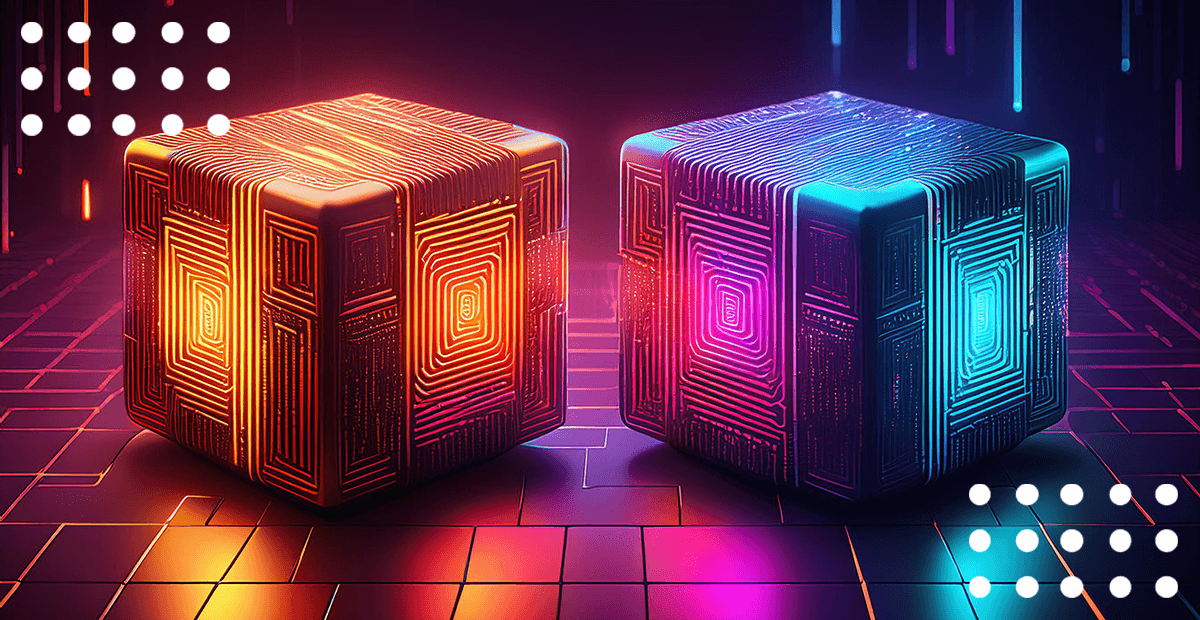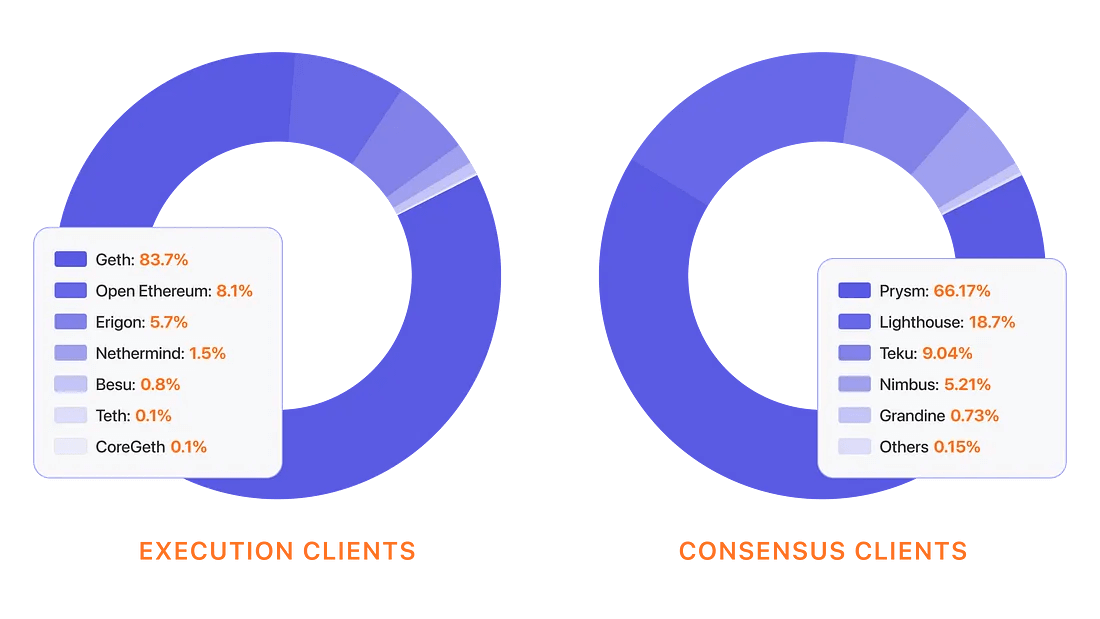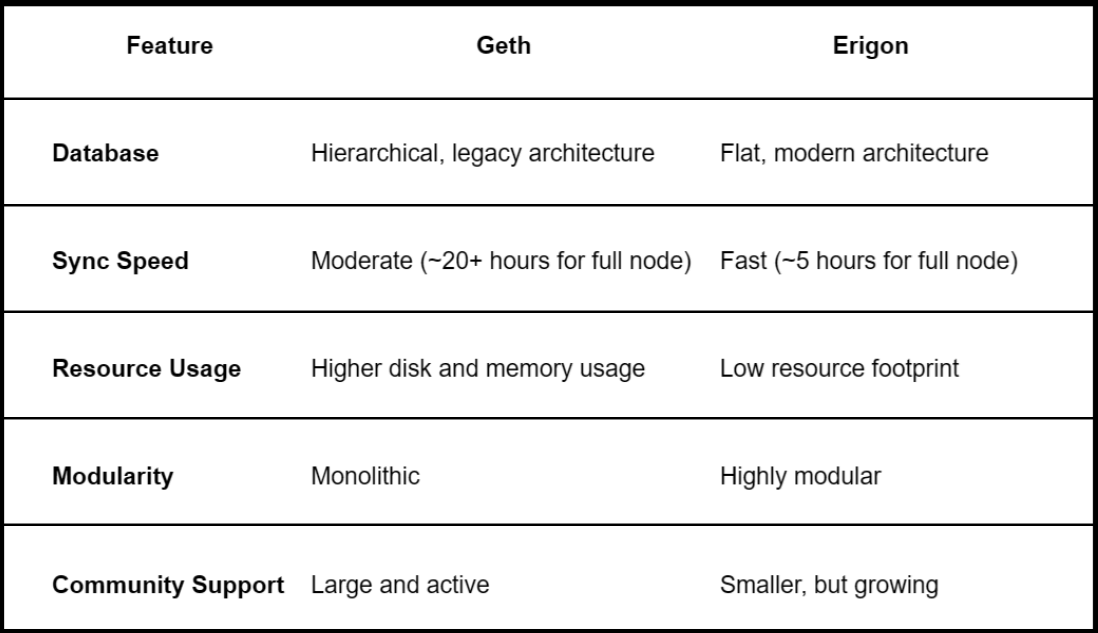Geth vs. Erigon: The Ultimate Ethereum Client Comparison Guide



Ethereum has a diverse and thriving client ecosystem, securing the badge of honor as the most adopted chain. Node operators validate transactions when executing a smart contract or transferring tokens. Geth and Erigon are two of the most significant options.
We will explore their strengths, weaknesses, and use cases. Further, compare them with each other. There are also several potential alternative options for those studying other Ethereum execution clients.
Ethereum clients allow computers to connect to the Ethereum network to validate and broadcast transactions, all while maintaining the consensus mechanism.
They also provide tools for interacting with the blockchain and testing application compatibility. Since Ethereum transitioned to Proof of Stake in 2022, the client architecture has been bifurcated into execution clients and consensus clients. Both have their uses, and many people have both in their toolkits.
Execution clients manage the Ethereum Virtual Machine (EVM), execute transactions, and interact with smart contracts. Consensus clients implement Ethereum’s PoS protocol to validate blocks and maintain the chain’s integrity.
The choice of an execution client often impacts the efficiency and success of your projects. Some essential aspects are synchronization speed, resource consumption, extensibility, and community support. Even though they have markedly different characteristics, Geth and Erigon have emerged as the most popular options.
[.c-wr-center][.button-black]Get Started[.button-black][.c-wr-center]
The flat database schema restructures how blockchain data is stored and serves as Erigon’s standout feature. Geth stores blockchain data hierarchically, leading to overhead. Erigon, by contrast, prunes unnecessary data and reorganizes the database for faster read and write operations, which reduces storage requirements by up to 50% compared to Geth.
Another key differentiator is modular infrastructure. Each component—such as the RPC daemon, execution engine, and storage layer—can be independently replaced or extended. This makes Erigon ideal for specialized applications requiring tailored configurations, such as Layer 2 rollups or high-frequency trading platforms.
Synchronization speed is a major strength of Erigon. Benchmarks reveal that it can sync a full Ethereum node up to four times faster than Geth. That makes it approximately five hours. Fast synchronization is a must for many applications, especially those in the DeFi industry.
[.c-box-wrapper][.c-box][.c-text-center]You might be interested in: EIP-7781: New Effort to Increase Ethereum’s Throughput[.c-text-center][.c-box][.c-box-wrapper]
Like everything, Erigon does have drawbacks. Modularity and technical sophistication can be intimidating for beginners or small teams without deep blockchain expertise. That inevitably leads to more time and money invested. It also gives users limited access to troubleshooting resources and third-party tools stemming from a smaller user base.
Erigon is best suited for use cases requiring high performance and efficiency. Large-scale Ethereum infrastructure, such as Layer 2 solutions or analytics platforms, benefits from reduced resource consumption and faster synchronization. Thanks to its modularity, it is ideal for experimental or cutting-edge applications that require custom configurations or non-standard features.
Geth, or Go Ethereum, is the original Ethereum client and remains the most widely used execution client. Widespread adoption makes it the default choice for developers and enterprises seeking a reliable, well-documented, and extensively supported client. Geth is appreciated for its stability and has been the foundation of the Ethereum ecosystem since its inception. Every major proposal or upgrade had to be coded into Geth before anything else.
Over 70 to about 80% of Ethereum nodes run on Geth. That means good support, but some also tackle it for introducing a centralization risk. Solana used to have the same problem, but now a new competitor client, Firedancer, is available. Read more about it in our article.
However, because Erigon is faster and has a growing community with new possibilities, it has been increasing over time in terms of the percentage of all nodes. Recognizing that Erigon is the future, Tatum has been one of the first providers to switch to Erigon.

[.c-box-wrapper][.c-box][.c-text-center]You might be interested in: Blockchain Trilemma Explained by Industry Experts[.c-text-center][.c-box][.c-box-wrapper]
Ever since its inception, Geth has been the cornerstone of Ethereum. Its reliability and robust documentation make it the client of choice for developers across the spectrum, from individual hobbyists to huge enterprises.
Geth has been extensively tested through numerous Ethereum upgrades and hard forks, leading to reliable service even in challenging network conditions. A rich suite of APIs makes it easier to deploy and manage dApps.
Geth relies on a hierarchical data model that, while robust, is less efficient than Erigon’s flat database. This translates to higher disk space usage and slower synchronization times. For example, synchronizing a full Ethereum node with Geth can take over 20 hours, compared to Erigon’s significantly faster performance. While not really that relevant for modern mining operations, Geth has a recommended RAM of 16 GB, while Erigon requires double that.
Extensive ecosystem support is what sets Geth apart. Thanks to the large user base, a wealth of third-party tools, libraries, and community resources is available. Geth is unmatched if you are a developer seeking a client with the most extensive documentation and troubleshooting support.
[.c-box-wrapper][.c-box][.c-text-center]You might be interested in: Erigon Quick Fix Leads to Over 1,000% RPS Improvement![.c-text-center][.c-box][.c-box-wrapper]
Extensive ecosystem support is what sets Geth apart. Thanks to the large user base, a wealth of third-party tools, libraries, and community resources is available. Geth is unmatched if you are a developer seeking a client with the most extensive documentation and troubleshooting support.
Geth is like a Swiss knife for Ethereum. In education or research, it is the go-to client for developers building dApps, running validators, or managing Ethereum nodes. Smooth integration with existing tools and networks is achieved with high compatibility.
The choice mainly depends on the user's specific requirements. Geth excels in stability, community support, and ease of use. Erigon offers superior performance, resource efficiency, and modularity. By the way, Tatum's team left its mark on it.

[.c-box-wrapper][.c-box][.c-text-center]You might be interested in:What Are Blockchain Validiums, and How They Work[.c-text-center][.c-box][.c-box-wrapper]
Before you make your decision, let us briefly introduce alternatives that might be on the table.
Build blockchain apps faster with a unified framework for 60+ blockchain protocols.